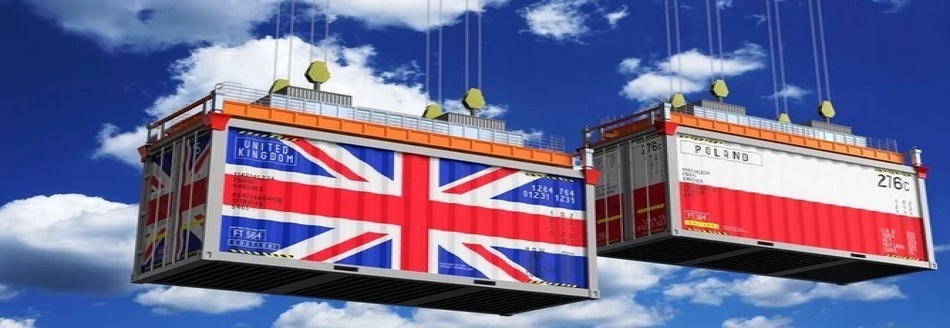Transport to the United Kingdom. Transport Poland - UK - Poland
What types of freight transport are most commonly used in Poland - United Kingdom transport, and what benefits arise from their use?
What challenges related to road regulations in the United Kingdom must Polish transport companies take into account to ensure safety and timely deliveries?
The United Kingdom, consisting of England, Scotland, Wales, and Northern Ireland, is one of the most important countries in Europe in terms of economic, cultural, and political influence. This country is famous for its exceptional history, innovative technological solutions, and a developed service sector. London, the capital of the United Kingdom, is one of the largest financial centers in the world, as well as a key communication and logistics hub.
Polish transport companies handling transport to the United Kingdom transport goods worth an average of about PLN 60,727.6 million annually. Transport from the United Kingdom to Poland generates an average turnover of PLN 21,805.5 million.
Transport to the United Kingdom is a crucial part of the international transport market, enabling smooth trade between Poland and the United Kingdom. Despite the challenges resulting from Brexit, Poland - United Kingdom transport remains one of the key trade routes for Polish companies. The United Kingdom, being one of Poland's largest trading partners, attracts a wide range of goods, including machinery, electronic devices, food products, and textiles. At the same time, goods such as chemical products, pharmaceuticals, and raw materials are transported from the United Kingdom to Poland. Poland - United Kingdom transport mainly takes place by land, sea, and air, allowing services to be tailored to the specific needs of the goods and customer requirements.
Transport to the United Kingdom is a logistical process that requires precise planning and coordination. Due to the island nature of the United Kingdom, a key element of the transport is crossing the English Channel. Polish carriers most often use ferries and the channel tunnel, which allows for fast and efficient connections between continental Europe and the British Isles. It is worth noting that transport is carried out both in a door-to-door system and through logistics centers at key ports such as Dover and Calais. Polish transport companies also offer intermodal solutions, combining different means of transport, which optimizes delivery time and costs.
What goods are transported to the United Kingdom?
The transport includes a wide range of products, from food items that require special refrigeration conditions to industrial machinery and luxury goods. When transporting food products to the United Kingdom, it is crucial to maintain the continuity of the cold chain, which requires specialized vehicles and temperature monitoring systems. Transporting machinery and industrial equipment involves the use of proper safety measures, such as securing straps, platforms, and shock-absorbing systems. Meanwhile, high-value goods, such as electronics or jewelry, are transported to the UK with particular safety measures, including GPS monitoring and insurance against theft.
Polish companies play a key role in transport to the United Kingdom, providing services at the highest level. Thanks to experience in international logistics and flexibility in adapting to changing customs regulations, Polish carriers gain trust in the British market. Many companies invest in modern fleets that meet Euro 6 environmental standards, which reduces emissions and complies with stringent environmental requirements. Additionally, Polish transport companies offer a wide range of services, including express transport to the United Kingdom, transportation of oversized loads to the UK, and the transport of hazardous materials (ADR).
An important element of international transport to the United Kingdom is a well-developed logistics infrastructure and familiarity with customs requirements and regulations in both countries. In road transport, one of the most frequently used routes is through Germany, Belgium, France, and the English Channel, which provides fast connections between Poland and the United Kingdom. Popular seaports such as Dover, Felixstowe, and Portsmouth play a key role in handling freight transport, especially in the context of container shipping. Meanwhile, air transport, which mainly operates through airports in London, Manchester, or Birmingham, ensures fast delivery of high-value or special-condition goods, such as pharmaceuticals or electronics.
What goods are transported from the United Kingdom to Poland?
Transport from the United Kingdom to Poland also plays an important role in trade between the two countries. Thanks to a developed transport network and cooperation with logistics partners, deliveries of goods from the United Kingdom to Poland are efficient and timely. Key products transported in this relationship include industrial raw materials, agricultural food products, and high-tech products. Thanks to various transport solutions such as refrigerated transport to the United Kingdom, carriers can ensure the appropriate conditions for transporting goods requiring temperature control, which is important for food or pharmaceutical products.
Poland - United Kingdom Poland transport is a dynamic segment of forwarding and logistics that supports the economic development of both countries. Polish carriers are appreciated for their flexibility, punctuality, and competitive prices, making them a popular choice for British contractors. They offer a wide range of transport services, from standard transport to ADR transport to the United Kingdom (UK), as well as multimodal transport services, which help optimize costs and delivery times. Another important point is the safety of transport, ensured by modern fleets and advanced monitoring systems that allow for real-time tracking of shipments.
Road regulations in the United Kingdom and traffic organization within the UK
Left-hand traffic is one of the most characteristic elements of the British road system, requiring foreign drivers to be properly prepared. The road infrastructure is of a high standard, and transport regulations are strictly adhered to. The United Kingdom also has a well-developed highway network, such as the M1, M6, or M25, which facilitates the efficient transport of goods throughout the country.
Transport on the Poland - United Kingdom - Poland route also requires consideration of specific road conditions and regulations. In the United Kingdom, where left-hand traffic is mandatory, drivers must be properly trained to drive safely on the roads. Additionally, regulations concerning driver working hours and speed limits must be strictly adhered to, which is crucial for ensuring the safety and punctuality of deliveries. Polish transport companies, thanks to their experience, successfully cope with these challenges, offering services at the highest level.
Transport to the United Kingdom also requires special attention to speed restrictions, which apply to roads in the UK. On highways, the maximum speed is 70 miles per hour (about 113 km/h), on national roads, the limit is 60 miles per hour (about 97 km/h), and in urban areas, the limit is usually 30 miles per hour (about 48 km/h). For heavy vehicles, the regulations are stricter – they can travel at a maximum speed of 60 miles per hour (97 km/h) on highways and 50 miles per hour (80 km/h) on national roads. Drivers must also use tachographs, which record driving time and breaks, ensuring compliance with working hour regulations. By properly following these regulations, transport to the United Kingdom is carried out safely and in accordance with local requirements.
The impact of Brexit on freight transport between Poland and the UK
Brexit had a significant impact on freight transport between Poland and the United Kingdom. The UK's exit from the European Union brought about a series of new customs and regulatory changes, which altered how goods are transported between these two countries. Polish carriers had to adapt to new requirements, such as the need to prepare additional documentation, customs clearances, and adhering to more stringent procedures at ports and borders.
These changes affected delivery times and costs. The necessity of customs clearance led to delays, especially in the early months after Brexit, when there were additional delays related to adapting to the new regulations. At the same time, increased transport costs due to customs fees and administrative charges impacted the prices of logistics services.
Despite these challenges, Polish transport companies successfully adapted to the new conditions and continue to perform transport to the United Kingdom efficiently. Thanks to experience and flexibility in adjusting to changes, Polish carriers offer support in customs clearances, helping clients smoothly navigate logistics processes. Additionally, the growing demand for transport between Poland and the United Kingdom has allowed many companies to expand and invest in modern fleets and technologies that streamline logistics management.
Despite the challenges, Brexit also created new opportunities. The introduction of independent trade agreements by the United Kingdom with countries outside the EU opens doors for greater trade diversity, which indirectly affects the development of transport services. Through cooperation with logistics partners, Polish companies continue to play a key role in maintaining the smooth flow of trade between Poland and the United Kingdom.

 pl
pl  en
en  de
de  es
es  fr
fr  it
it  pt
pt  ru
ru  sv
sv 
















